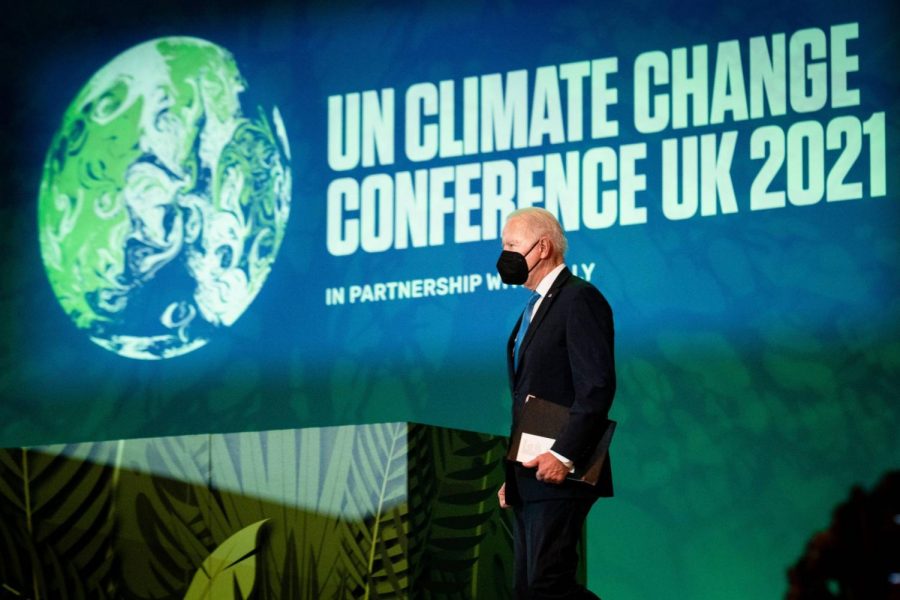The Glasgow Climate Conference – Will it Deliver?
U.S. President Joe Biden at the Climate Change Conference, 2021.
December 8, 2021
*The opinions expressed within the content are solely the author’s and do not reflect the opinions and beliefs of the website or its affiliates.*
On the evening of November 13th, 2021, the 26th Conference of the Parties of the United Nations Framework Convention on Climate Change (COP26) closed in Glasgow, UK. This conference was the first notable world climate summit following the Paris agreement to reflect on past actions and whether nations are on their way to meeting crucial environmental targets. The overarching takeaway is that over 200 nations agreed on accelerating the fight against the climate crisis. Countries made tougher pledges during the conference, such as cutting methane pollution, sustainable deforestation, and coal financing. Despite the ambitious goals set in the meeting, there are still serious doubts and concerns about the accountability of these promises, with significant obstacles facing the world due to conflicting interests between developing and developed nations.
It was already universal knowledge coming into the Glasgow climate change conference that the world is off-track to meet its target of limiting the temperature increase to 2 degrees Celsius or less. According to the statistics, only Gambia has been sufficient in regulating its carbon emission in compliance with the Paris agreement (Climate Action tracker). Furthermore, the world as a whole only met one-fourth of the initial emission standard. These past inactions and empty promises question the latest pledge made in Glasgow. Furthermore, the worry is that there are hardly any specific actions mentioned in the communiqué, and there is no exact date for achieving the net-zero carbon emission target. To many, this framed the Glasgow conference as a hollow public relations campaign rather than a legitimate environmental event seeking actual resolutions.
The key obstacle standing in the way of climate action is incorporating developing nations because of the lack of funds for clean energy and the economic strain these green efforts would place on these countries. This issue was reflected in the last moments before the conference’s closing. India, alongside China, the two biggest developing nations globally, requested that the agreement’s wording be revised to reflect the interests of these developing countries. The new communiqué also expressed regret and dissatisfaction on developing countries over the failure of wealthier nations to fulfill their promises, highlighting the world’s difficulty in cooperating on climate change issues across economic bounds. Dissatisfaction arose at the meeting because the U.S and European Union failed to fulfill their pledge to provide 100 billion U.S. dollars per year to help impoverished countries cope with climate change by 2020. The lack of funding and technical support to upgrade the energy-generating sector of these regions was a crucial hindrance to the success of this conference despite developing nations accounting for 5.4 billion of the world’s population (PRB). Developing countries have a lower historical responsibility for carbon emissions, but they have suffered more losses caused by climate change. According to the U.N.’s report, at the present rate, the related economic losses suffered by developing countries have reached three times that of high-income countries. As the global temperature rises, it is estimated that developing countries’ annual climate adaptation costs will reach 300 billion U.S. dollars in 2030 and may reach 500 billion U.S. dollars in 2050 (OCHA Service). Therefore, carbon zero is an impossible target without the full cooperation of developed countries providing sufficient funds. Thus, the integrity of this recent conference must be viewed with a degree of skepticism.
Though many of the promises might have been empty talks, the conference was not completely unavailing; it provided some hope regarding other climate change topics. For example, the parties have agreed to stop and reverse the trend of deforestation and land degradation by 2030 and set a target to provide corresponding countries with 19 billion dollars in public and private funds to protect and restore forests. Individual promises were made, too, including Jeff Bezos’ investment pledge of two billion dollars in restoring natural habitats and transforming food systems to reduce their carbon footprint. To ensure these commitments and agreements transfer to tangible results, the Glasgow Climate Change Conference should actively advocate for all parties to implement the goals promised effectively. Additionally, the Conference representatives should propose clear and powerful implementation paths and specific policy measures and pass laws to ensure these commitments are implemented.
“It is the last chance to reverse the situation,” U.N. Secretary-General Antonio Guterres said.
Time is of the essence if the international community is to reverse the effects of climate change, and the world needs to realize its urgency. As for students of UHS, we can start making a change by participating in local environmental-related community service initiatives such as beach clean-ups. If individuals in their communities can contribute in small yet meaningful ways and if our global institutions can uphold their promises, the world will be able to heal and shift towards a more sustainable future for generations to come.






Lavar Munogerwa • Dec 10, 2021 at 9:47 pm
What an incredible article! I have never been more proud of University High School’s fantastic students